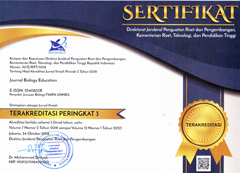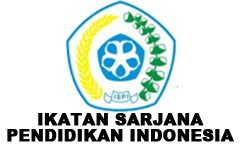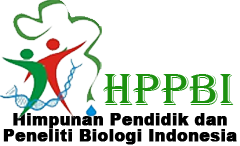PENGEMBANGAN LEMBAR KERJA SISWA BERBASIS KARAKTER MATERI EKOSISTEM
Abstract
Student worksheets are integral parts of instructional models by which teachers create particular tasks to involve students in inquiry processes and character deveopment. This study was aimed at developing and field-testing the use of character-based biology worksheet on student achievement. It belonged to Research and Development with Pre-test Post-test Nonequivalent Control Group Design as field-testing design. Sample was collected by convenience sampling technique. T-test results showed significant difference between treated and non-treatedgroups (tcount > ttable). Simple linear regression test results showed that implementation of the character-based worksheet brought a significant effect on student achievement, namely post-test scores (probability sig.<0.05; r square 0.72) and affective score (probability sig.< 0.05; r square 0.62). The conclusion of this research was that character-based worksheet implementation had significant effect on student achievement.
Â
Lembar Kerja Siswa (LKS) merupakan bagian integral dari suatu model pembelajaran pilihan guru, namun belum tentu tugas pada LKS mendorong siswa terlibat dalam proses inkuiri biologi yang mendorong penanaman karakter, sementara itu, obyek dan fenomena ekosistem berpotensi untuk penanaman karakter. Penelitian ini bertujuan mengembangkan dan menguji pengaruh LKS berbasis karakter terhadap hasil belajar siswa. Penelitian ini merupakan penelitian Research and Development dengan pola Pre-test Post-test Nonequivalent Control Group Design yang diterapkan pada kelas VIIC sebagai kelas eksperimen dan VIID sebagai kelas kontrol. Pengambilan sampel menggunakan teknik convenience sampling. Hasil uji T menunjukkan perbedaan signifikan antara kelompok eksperimen dan kontrol (thitung > ttabel). Uji regresi linier sederhana menunjukkan bahwa penerapan LKS berbasis karakter berpengaruh terhadap nilai hasil belajar, yaitu skor post-test (nilai sig.< 0.05; r Square 0,72) dan skor afektif (nilai sig.< 0.05; r Square 0,62). Simpulan dari penelitian ini adalah LKS berbasis karakter berpengaruh signifikan terhadap hasil belajar siswa.
References
Arends, R.I. 2008. Learning to Teach: Belajar untuk Mengajar. Terjemahan Helly Prayitno Soejipto. Yogyakarta: Pustaka Pelajar. Hal: 142-146
Benninga, J.S., Berkowich, M.W., Kuehn, P. & Smith, K. 2003. The Relationship of Character Education Implementation and Academic Achievement in Elementary School. Journal of Reseacrh in Character Education. Vol.1 (1): 19-23 pp
Berkowitz, M.W. & Bier, M.C. 2006. A Research-Driven Guide for Educators: What Works in Character Education. Character Education Partnership: USA. Pp: 1-34
[BPS] Badan Pusat Statistik. 2012. Kecamatan Kertek dalam Angka Tahun 2012. Wonosobo: Badan Pusat Statistik. Hal: 5-12
Celikler, D. 2010. The Effect of Worksheets Developed for The Subject of Chemical Compounds on Student Achievement and Permanent Learning. Educational Research Association the International Journal of Research in Teacher Education. Vol. 1(1):42-51pp
Dimopoulos, I.D., Pantis, P. & Paraskevopoulos, S. 2009. Planning Educational Activities and Teaching Strategies on Constructing A Conservation Educational Modul. International Journal of Environmenttal and Science Education. Vol. 4(4):351-364 pp
Guney, P. 2007. Five Factors for Effective Teaching. New Zealand Journal of Teachers’ Work. Vol. 4 (2): 89-95 pp
[KEMENDIKBUD] Kementerian Pendidikan dan Kebudayaan. 2011. Pedoman Pelaksanaan Pendidikan Karakter. Jakarta: Kemendikbud. Hal: 1-4
Koesoema, D.A. 2010. Pendidikan Karater: Strategi Mendidik Anak di Zaman Global. Jakarta: Grasindo. Hal: 222-225
Martin, R., Colleen,S., Franklin, T. & Gerlovich, J. 2005. Teaching Science for All Children: Inquiri Methods for Constructing Understanding. USA: Pearson. Pp: 12-21
Muijs, D. & Reynolds, D. 2008. Effective Teaching: Teori dan Aplikasi. Terjemahan Helly Prayitno Soejipto. Yogyakarta: Pustaka Pelajar
Ozmen, H. & Yildirim, N. 2005. Effect of Work Sheets on Student’s Success: Acids And Bases Sample. Journal of Turkish Science Education. Vol. 2(2): 10-13 pp
Park, N., Peterson, C., Seligman, M.E.P. 2006. Character Strengths in Fifty-four Nations and The Fifty US States. The Journal of Positive Psychology. Vol. 1 (3): 118-129 pp
Prastowo, A. 2011. Panduan Kreatif Membuat Bahan Ajar Inovatif . Yogyakarta: Diva Press. Hal: 203-226
Sewell, D.T. & College, A.B. 2003. Teacher’s Attitudes Toward Character Education and Inclusion in Family and Consumer Science Education Curriculum. Journal of Family and Consumer Science Education. Vol. 21(1):11-17 pp
Stallions, M.A. & Yeatts, K. 2003. Enhancing Character Education for Tomorrow’s Teacher, Today: A Connected Learning Partnership Model. Florida Association of Teacher Educator Journal. Vol.1 (3): 250-260 pp.
Stedje, L.B. 2010. Nuts and Bolts Character Education. Literature Review. USA: CharacterFirst. Pp :1-6
Suparno, P. 2001. Teori Perkembangan Kognitif Jean Piaget. Yogyakarta: Kanisisus. Hal: 44-46
Tilaar, H.A.R. 2006. Standarisasi Pendidikan Nasional: Suatu Tinjauan Kritis. Jakarta: Rineka Cipta
Vygotsky, L.V. 2004. Imagination and Creativity in Chilhood. Journal of Russian and East Europe Psychology. Vol. 42(1): 7-97 pp
Webber, J. 2006. Sartre’s Theory of Character. European Journal of Philosophy. Vol. 14 (1): 94-116 pp
Yildirim, N., Kurt, S. & Ayas, A. 2011. The Effect of The Worksheet on Student’s Achievement in Chemical Equilibrium. Journal of Turkish Science Education. Vol. 8(3): 44-58 pp
Zion, M., Shapira, D., Slezak, M., Link, E., Bashan, N., Brumer, M., Orian, T., Agerst, B., Nussinovich, R. & Mendelovici, R. 2004. Biomind: A New Biology Curriculum That Enables Authentic Inquiry Learning. Journal of Biological Education. Vol. 38 (2): 59-65 pp
The copyright of the article once it is accepted for publication shall be assigned to the journal as the publisher. The intended copyright includes the right to publish the article in various forms (including reprints). The journal maintains the publishing rights to the published articles.
This work is licensed under a Creative Commons Attribution 4.0 International License.







